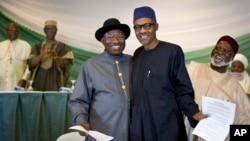Nigeria's president and his main challenger have released a statement pledging to respect the outcome of Saturday's election as long as it is "free, fair and credible."
In a statement to reporters in Abjua, Bishop Matthew Hassan Kuka, a member of the National Peace Committee, said that "we call on INEC [Nigeria's Independent National Electoral Commission] and all security agencies to ensure strict adherence to their constitutional roles. We also pledge to respect the outcome of a free, fair and credible election.
"Today we again renew our commitment to a united, democratic and prosperous Nigeria. We want to appeal to all Nigerians to stand together at this critical phase of our nation's history."
The candidates also called on Nigerians to refrain from violence or any acts that may jeopardize the election's credibility.
The statement is a follow-up to an accord signed in January in which President Goodluck Jonathan, former military ruler Muhammadu Buhari and nine other party leaders pledged to run peaceful, issue-based campaigns.
In Washington, the U.S. State Department announced Thursday that a senior diplomat would travel to Nigeria for the elections. Linda Thomas-Greenfield, the U.S. assistant secretary of state for Africa, will lead an observation mission for Saturday's election.
Nigeria has seen very little election-related violence this year, but there are concerns about unrest if Saturday's results are seen as fradulent or if they are disrupted by the insurgent group Boko Haram.
Post-election violence in 2011 killed some 800 people.
The INEC is hoping to prevent fraud with a new biometric voter identification system.
Al Jazeera journalists
Meanwhile, the Al Jazeera news organization says Nigerian forces have held two of its journalists in custody since Tuesday, as the country tightens security ahead of the polls.
The Qatar-based television network released a statement Thursday demanding the release of the Nigerian journalists Ahmed Idris and Ali Mustafa, who were working for Al Jazeera when they were detained in Maiduguri, Borno state.
The network says the two men were seized in their hotel rooms after returning from covering a story on Nigerian forces fighting Boko Haram. The military said in a statement that the men were operating "without protection, accreditation or due clearance."
Boko Haram
Also Thursday, Human Rights Watch reported that Boko Haram has killed more than 1,000 civilians since the beginning of the year, based on media analysis and witness accounts. It said people fleeing the violence in northern Nigeria have reported "horrific" levels of brutality, including burning villages, abducting women, and forcing men to join their ranks and fight.
The Nigerian government has closed the country's land and sea borders and will not reopen them until midnight on March 28. It said the move is designed "to allow for peaceful conduct of the forthcoming national elections."
The vote was delayed from mid-February because of insecurity in the northeast, where the Boko Haram insurgency has raged since 2009.
Earlier this week, Nigerian government spokesman Mike Omeri told reporters that Boko Haram militants had kidnapped hundreds of people from the town of Damasak, on the border with Niger, as they withdrew from the area earlier this month.
But Thursday, the Nigerian government denied that report. The National Information Center said in a statement, "There is no fresh abduction in Damasak'' in Borno state, but it added that it did not have figures for the number of missing people in the community.
Boko Haram provoked an international outcry last year when it kidnapped more than 200 schoolgirls from a government-run secondary school in the Borno state town of Chibok. The girls have yet to be found.
Nigeria's military says an ongoing multinational offensive has retaken most towns that were held by the Islamist extremists. The militants are said to have lost all their territory in Yobe and Adamawa states, leaving them in control of only small parts of Borno.
Ubale Musa in Abuja contributed to this report.





